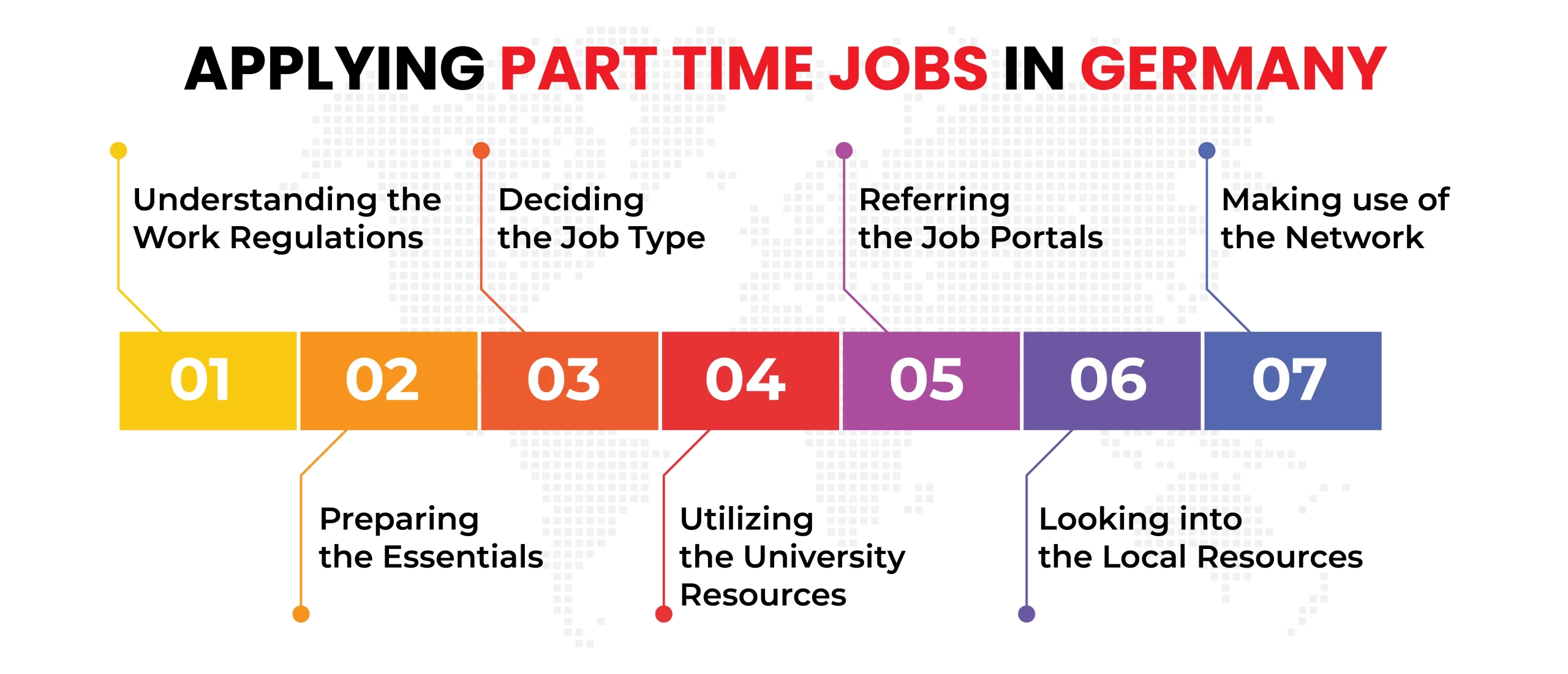Currently, there are nearly 5,00,000 international students studying in Germany. Collecting the previous years’ data and, if the graph is plotted, one can infer that there is an increasing trend. In recent times, there has been a growing influx of students coming to Germany for their education. One of the key factors attracting students is the availability of free education in Germany, along with several other advantages the country offers. For international students who are unsure about what and where to study in Germany, this blog provides helpful guidance. It explains the best courses in Germany, covers essential information, and concludes with answers to frequently asked questions.
Table of Content
1Why Study in Germany2Best Courses in Germany for International Students3Diploma Courses in Germany4Requirements to Study in Germany for International Students5How to get Admission in Germany6Conclusion7Frequently Asked Questions ( FAQ )
Why Study in Germany
Low Tuition Fee: Most of the public universities in Germany charge very minimal fees to international students. This affordability factor is a major reason why international students choose to pursue courses in Germany.
Affordable living: The cost of living in Germany is very low. For international students who want to live comfortably in Germany, they need about €990 per month. This amount is considerably minimal compared to other Schengen countries.
Education System: The Germany Education System is known for its inclusivity, innovation, and implementation. Students highly value and recognize the quality of the Germany education, making Germany a preferred choice for those arriving abroad for studies.
Scholarships: Although tuition fees at German universities are low, there are many scholarships in Germany that further reduce the cost of studying. This attribute attracts the international student who decides to study abroad.
Employment Opportunities: International students can do part time jobs during their graduation period. After graduation, there are numerous employment opportunities in Germany in accordance with their honours.
Additionally, there are benefits such as a diverse student population and the chance to learn about German culture. These advantages make an excellent destination for international students who wish to attend its universities and colleges in Germany for education.
Best Courses in Germany for International Students

Germany study abroad programs offer students a unique opportunity to experience a rich cultural heritage while receiving a high-quality education. Choosing a course from the best courses in Germany requires careful consideration and analysis. Henceforth, the upcoming depicts the best courses to study in Germany for an international student:
1. Engineering
2. Business Management
3. Computer Science & IT
4. Arts & Humanities
5. Social Sciences
6. Law
7. Psychology
8. Medicine & Healthcare
9. Architecture
10. Natural Sciences
Let’s delve deeper for better understanding:
1. Engineering
It is no wonder that engineering tops the list, as it is the best course of study in Germany. Since World War II, Germany has placed a strong emphasis on engineering education, recognizing the vital role that engineers play in the workforce. Top universities in Germany teach the engineering course, and over the years, the growth and development in this field have been remarkable. Various branches of engineering, such as mechanical, electrical, and civil engineering, thrive and significantly contribute to the country’s economy and innovation.
| Popular Programs |
|
| Top Universities |
|
| Average Tuition Fee (€) |
|
| Job Opportunities |
|
| Average Annual Salary (€) |
|
2. Business Management
Like Engineering, Business Management is also a preferred course for international students. German universities offer a strong focus on practical experience, often incorporating internships and projects with industrial players. There are some of the best MBA programs in Germany that are crafted in accordance with the ever-demanding market situations. These areas of specialization focus on analytical and strategic thinking, which are mostly required in today’s world.
| Popular Programs |
|
| Top Universities |
|
| Average Tuition Fee (€) |
|
| Job Opportunities |
|
| Average Annual Salary (€) |
|
3. Computer Science & IT
Germany, as a technologically advanced country, provides a strong educational curriculum and modern facilities for students who come to study with a Germany study visa. The Science & IT sector is an evolving sector. No wonder the course is among the best courses in Germany. The need for computer science specialists continues to increase, and the German universities are highly qualified to meet the never-ending demand.
| Popular Programs |
|
| Top Universities |
|
| Average Tuition Fee (€) |
|
| Job Opportunities |
|
| Average Annual Salary (€) |
|
4. Arts & Humanities
Humanities & Arts is also an interesting area to study. Throughout history, it has served as the hub of all human cultures. The study can facilitate deeper intellectual understanding and lay the groundwork for a civically engaged life. Studying the humanities and arts prepares the student to think critically, act reactively, and succeed in a rapidly evolving world.
| Popular Programs |
|
| Top Universities |
|
| Average Tuition Fee (€) |
|
| Job Opportunities |
|
| Average Annual Salary (€) |
|
5. Social Sciences
Social science is a discipline that seeks to understand the reasons behind individual and collective behaviours through theories and empirical evidence that evaluate these actions. Studying social sciences in Germany provides students with a unique opportunity to explore the profound effects of the industrial revolution in the West and examine how society has transformed alongside technological advancements. This rich historical context allows for a deeper analysis of contemporary social dynamics and the ongoing impact of technology on human lives.
| Popular Programs |
|
| Top Universities |
|
| Average Tuition Fee (€) |
|
| Job Opportunities |
|
| Average Annual Salary (€) |
|
6. Law
Law is a tool to change the society and studying law in Germany offers international students a blend of theoretical knowledge and practical experience over 7 to 10 semesters. Since the course is placed among the best courses in Germany, many programs are available in English, though proficiency in German is often required for internships. With a respected degree and exposure to the European Legal System, law studies in Germany offer excellent career prospects.
| Popular Programs |
|
| Top Universities |
|
| Average Tuition Fee (€) |
|
| Job Opportunities |
|
| Average Annual Salary (€) |
|
7. Psychology
Psychology, often referred to as the “study of the soul,” explores human behavior and experience through empirical research. Being human-focused, this field of study has a unique position among the best courses in Germany. This field employs scientific methods to uncover the principles that govern mental processes and structures. Through coursework and research, students develop a comprehensive understanding of the complexities of the human mind. Students can pursue their masters in Germany to deepen their understanding of rational thinking and human behaviour.
| Popular Programs |
|
| Top Universities |
|
| Average Tuition Fee (€) |
|
| Job Opportunities |
|
| Average Annual Salary (€) |
|
8. Medicine & Healthcare
Medicine and healthcare, among the best courses in Germany, provide high-quality education at an affordable cost. Since Germany is home to some of the world’s leading medical institutions, thousands of students enroll in medical programs each year. With a focus on hands-on training and best research, these programs prepare students for successful careers in healthcare.
| Popular Programs |
|
| Top Universities |
|
| Average Tuition Fee (€) |
|
| Job Opportunities |
|
| Average Annual Salary (€) |
|
9. Architecture
Studying architecture in Germany provides international students with a mix of innovative design and technical expertise. Programs emphasize theoretical foundations and practical application, covering urban planning, sustainable design, and building technology. With Germany’s rich architectural heritage and modern industry, students gain valuable experience, preparing them for successful careers in architecture and related fields. With a valid Germany visa, one can land for architectural education in no time.
| Popular Programs |
|
| Top Universities |
|
| Average Tuition Fee (€) |
|
| Job Opportunities |
|
| Average Annual Salary (€) |
|
10. Natural Sciences
Natural Sciences is one of the branches of science that deals with the physical world, covering sub-disciplines like physics, chemistry, geology, and biology. Students find natural sciences courses worthwhile in Germany as they focus comprehensively on the practical application of theoretical knowledge in laboratories. Moreover, programs in natural sciences provide international students with excellent educational opportunities and hands-on research experiences.
| Popular Programs |
|
| Top Universities |
|
| Average Tuition Fee (€) |
|
| Job Opportunities |
|
| Average Annual Salary (€) |
|
Diploma Courses in Germany
In addition to the best courses in Germany, an international student also comes to pursue a diploma in Germany. There are many options for diploma courses available for an international student from the best universities in Germany. For basic knowledge, the following lists down the top diplomatic courses in Germany for international students:
- Quantum Diploma – Leadership and Management
- Diploma in Directing – Artist Folkwang
- International Diploma in Brewing Technology
- Soft Tissue Management for the Aesthetic Zone
- Postgraduate Diploma in Management
Requirements to Study in Germany for International Students
For an international student looking to embark on higher education in Germany, it’s essential to understand the basic requirements for studying there. Henceforth, the following list down the key requirements for admission to German universities:
1. University Application Form
2. University Enrolment
3. Valid Transfer Certificates
4. Transcripts
5. Proof of Language Proficiency
6. Letter of motivation & recommendation (if applicable)
7. Resume (or) CV
8. Standardized tests (if applicable)
9. APS Certificate
10. Proof of Financial Resources (€12,000/year)
11. Health Insurance
12. German Student Visa
13. Accommodation
How to get Admission in Germany
Usually, Germany intakes during two terms: winter and summer. Hence, international students must begin the admission process prior to the intakes. When applying to German universities, students need to follow the series of steps outlined below:
Step-1: Visit the DAAD Website to gather the basic knowledge about courses and universities. Finalize the course and the university once after visiting the official website of the concerned institution.
Step-2: After finalizing, collect the necessary documents as mentioned in the course description.
Step-3: Filing the application involves two types: via direct or Uniassist. In case of direct, students can visit the official website of the university and start applying for the course.
Step-4: Once the student secures the admission, the next step is to process the visa. From the official website, gather the necessary documents. In case of aid during visa process, consider CanApprove.
Step-5: After visa filing, book an appointment for an interview in the Germany Consulate and carry the attested documents. Pay for the application fee after the interview and obtain the student visa.
Conclusion
Wrapping up, pursuing the best courses in Germany caters to the needs and aspirations of international students. With its world-class universities, innovative programs, and rich cultural experiences, studying in Germany not only enhances academic credentials but also provides invaluable personal growth opportunities. For further details regarding German universities and courses, consider CanApprove.



